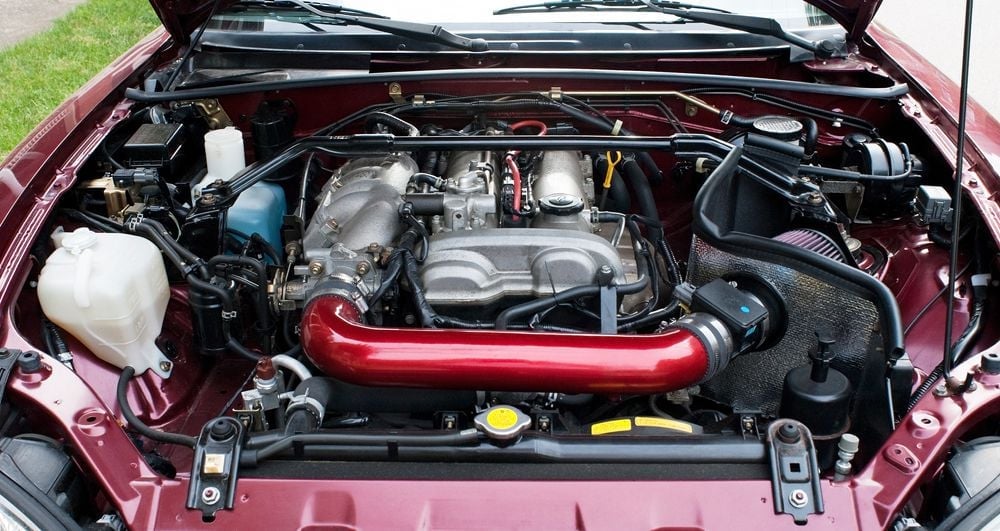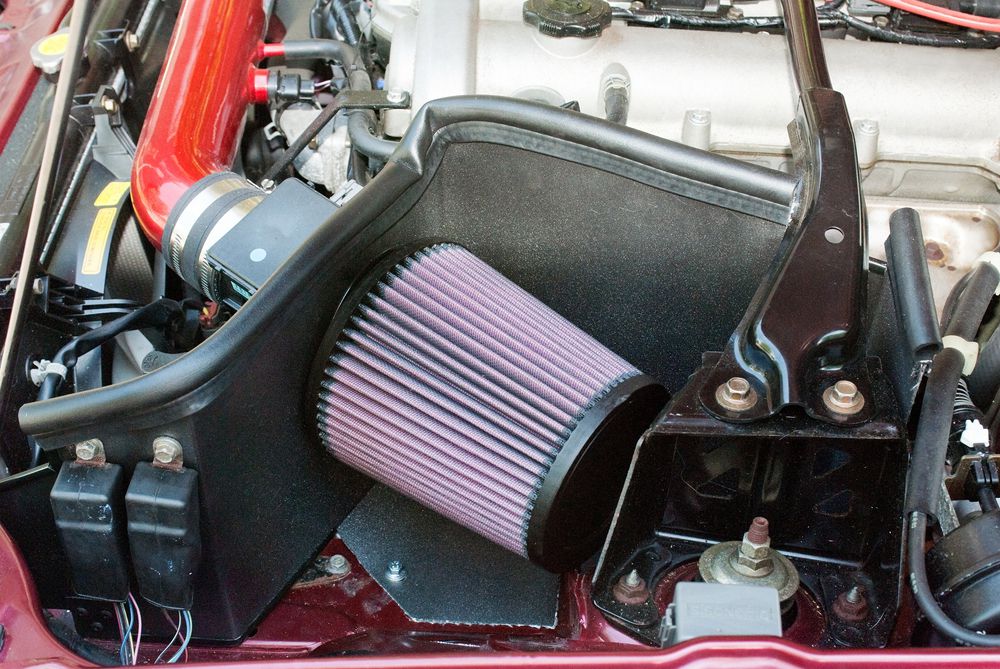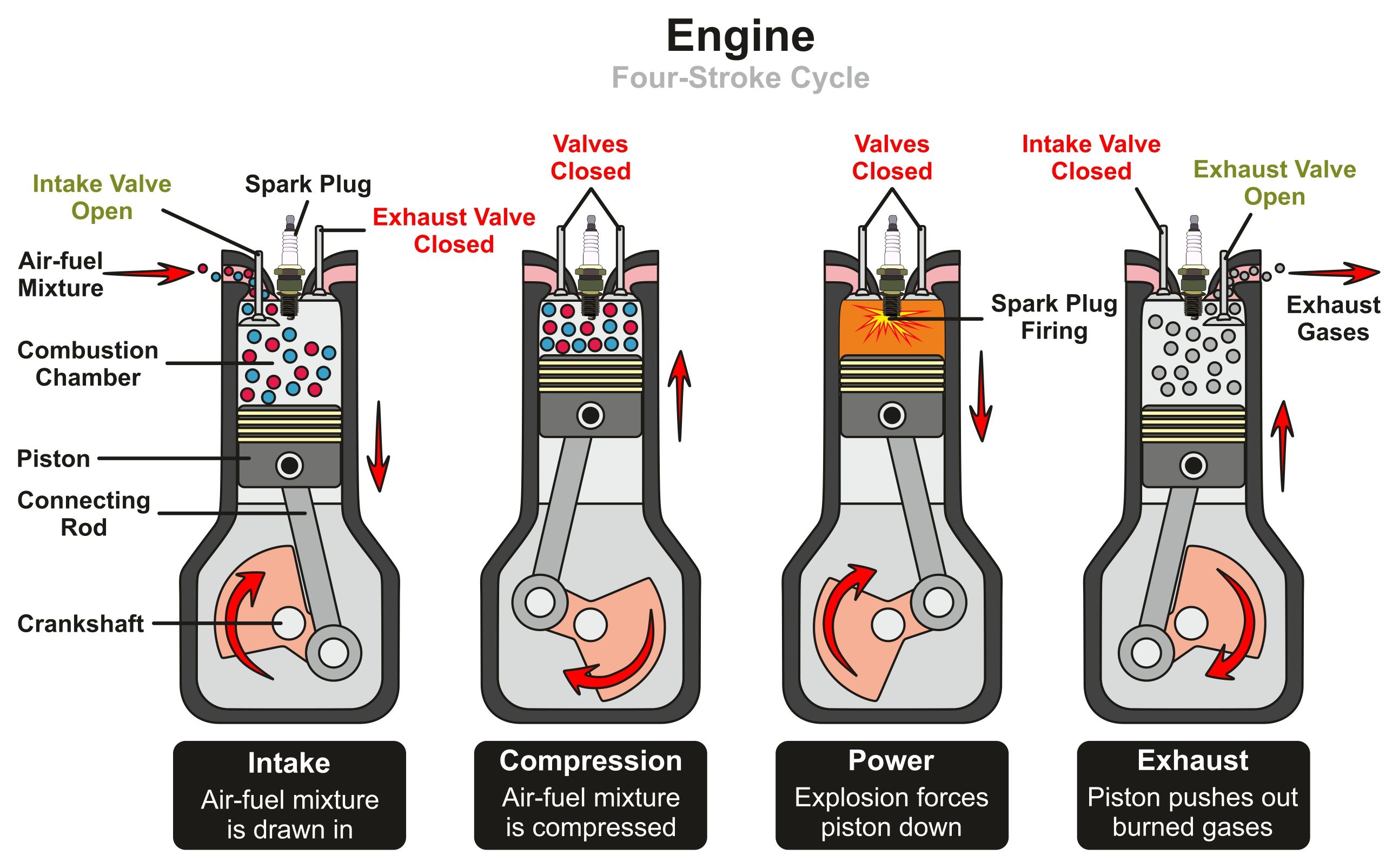
Adding aftermarket parts to your vehicle can help improve engine performance and affect the look and sound of your
vehicle. For example, some modifications can make your vehicle louder than what you're used to.
A cold air intake can help your engine run more efficiently by increasing the air volume entering the combustion
chamber. A cold air intake may also make your car louder from the front, usually a sucking sound, but won't increase
the sound coming from the car's muffler.
If you're thinking of adding a cold air intake to your car, take a minute to read below.
If you want a better performing, louder, more aggressive-sounding engine, this assembly could be right for you but be
sure to read up on the risks beforehand.
 Custom cold air intake
Custom cold air intake
What Does a Cold Air Intake Do?
A cold air intake is an aftermarket part that brings cooler air into an
internal combustion engine.
This intake is engineered to improve engine performance and fuel economy of an internal combustion engine by
increasing the amount of free oxygen available during the combustion process.
Cold air is denser than warm air, helping to increase the amount of oxygen by volume.
An engine running on cooler air can create more power using less fuel, increasing your car's overall performance.
 Custom cold air intake piping
Custom cold air intake piping
Why Are Cold Air Intakes So Loud?
Just because cold air intake systems are louder doesn't mean they're damaging your vehicle. Instead, the sounds
you're hearing are caused by increased airflow within the engine, helping to speed up the rate of combustion.
More efficient combustion can cause your engine to run a little warmer than usual, producing more noise. However,
it's nothing to worry about.
Why Do You Need Air in an Engine?
An engine requires air and fuel to create a combustion event in the combustion chamber.
Combustion in the combustion chamber is what applies force on the engine's pistons, moving them up and down.
As the pistons move up and down, their linear motion turns a crankshaft, creating rotational motion that powers the
wheels and propels the vehicle.
Without oxygen-rich air, your engine would not be able to create combustion.
Is a Cold Air Intake Worth It?
A Cold air intake is a relatively inexpensive way to give your vehicle a bit of a performance bump and make your
engine sound better.
When combined with a performance exhaust installation, another relatively inexpensive upgrade, the bump in
performance is even more significant.
Does Changing Air Intake Make Exhaust Louder?
One of the most common comments about cold air intakes is that they make your car louder.
Changing an intake will not make the exhaust louder; however, it may make the car's intake louder.
Aftermarket air intakes usually create a sucking sound from under the car's hood due to the increased air volume
sucked into the engine compared to the stock intake.
Does a Cold Air Intake Make a Difference?
Introducing more oxygen into your engine with an aftermarket cold air intake can create the same amount of power as a
stock intake but without using as much fuel.
What little fuel is burned will also be burned more efficiently, helping to generate more horsepower.
It's hard to say how much extra horsepower you'll experience as it varies depending on the type of system you've
installed and your vehicle's specs.
Systems with wider smooth-bore intake tubes are less restrictive and allow more air to flow into the combustion
chamber.
Likewise, systems with front-mounted air filters draw in colder air from high-pressure regions outside the main
engine block.
Why is Cold Air Better for Your Engine?
From a physics standpoint, cold air is naturally denser than warm air, which contains more oxygen per liter because
when molecules lose heat, they pack together more tightly.
For example, we can move our arms through loosely packed warm water, but as it cools into solid ice, the molecules
contract into a crystal form, preventing anything from passing through.
The same principle applies to air.
As the air cools, the oxygen molecules become more tightly packed within a smaller volume. So, when you pass cooler
air through the engine, you feed more oxygen into the system.
 Internal Combustion Engine Combustion Process
Internal Combustion Engine Combustion Process
Does Cold Air Intake Make a Car Faster?
A cold air intake won't make your car faster, per se, but it can help increase horsepower and acceleration.
The increase in oxygen entering the car's engine's combustion chamber leads to a more efficient combustion reaction.
You'll feel the difference when you press down on the accelerator, and your car more efficiently burns fuel into
energy, propelling you forward faster.
What are the Pros and Cons of a Cold Air Intake?
So what are the benefits of cold air intake?
The pros of a cold air intake are:
-
First and foremost, you'll notice that your engine feels more responsive and accelerates faster without using as
much fuel.
-
For anyone wanting a more aggressive-sounding car, cold air intakes can also add a manly roar to your engine.
-
Cold air intakes are relatively inexpensive when compared to other aftermarket performance upgrades.
-
Cold air intake installations are easily reversed back to stock configurations.
-
Decreased fuel consumption
Can a Cold Air Intake Damage My Car? The cons of a cold air intake are:
-
A loud engine could be a downside if you're not a fan of loud motors.
-
Debris in the Engine - Since cold air intakes are designed to increase airflow, they're often made with
more-permeable filters. Unfortunately, these filters are not always excellent at removing dirt and debris before
passing air into the engine.
-
Air Roll - Some cold air intakes are manufactured with a sharp 90-degree bend. This bend can cause your engine's
air meter to misread oxygen levels and lead to unoptimized combustion.
-
Hydrolocking - Since most cold air intakes are positioned outside the main engine block, they are prone to
collecting water rather than air. If water seeps into your engine, it cannot compress and will exert potentially
damaging pressure on the piston system.
For these reasons, you must always buy high-quality parts and take the time to research how to install aftermarket
parts properly.
Does a Cold Air Intake Increase Horsepower?
A cold air intake will not directly increase your car's horsepower, but it will allow your engine to breathe more
efficiently, leading to a slight increase in horsepower. Additionally, a cold air intake can improve your car's
acceleration by providing more oxygen to the engine.
As mentioned above, the difference will depend on the type of system you install and your engine's specifications.
Does a Cold Air Intake Increase MPG?
A cold air intake can improve your car's fuel economy by up to 5%, though the actual increase will depend on your car
and driving habits. For example, if you frequently drive in stop-and-go traffic or in hot weather, you may not see as
much improvement.
On the other hand, if you're generally light on the pedals and stick to high-way driving, you'll probably see a
difference in your vehicle's fuel efficiency.
How to Install a Cold Air Intake?
Before starting the installation process, be warned that you cannot drive your vehicle until after you've assembled
everything. Therefore, don't start the installation unless you have all of the necessary tools and the time to
complete the job.
To install a cold air intake, follow these steps:
-
Park your car on a level surface and open the hood. Disconnect the negative terminal from the battery to prevent
an electrical shock.
-
Locate the stock air intake box and disconnect the mass air-flow sensor wiring harness.
-
Remove the bolts that secure the air intake box to the engine using a socket wrench.
-
Remove the air intake box and discard it.
-
Unpack your cold air intake kit and locate all of the necessary components.
-
Install the air filter onto the cold air intake tube.
-
Secure the cold air intake tube to the throttle body using the provided clamps.
-
Reconnect the mass air flow sensor wiring harness to the cold air intake tube.
-
Reattach the battery negative terminal and close the hood.
-
Start your engine and let it idle for a few minutes to adjust to the new air intake volume.
Do You Need a Tune After Installing a Cold Air Intake?
Newer vehicles have an ECU that will self-optimize, so like stock vehicles, after installing a cold air intake, you do not need to retune
your car; however is recommended, particularly if you combine a cold air intake with an exhaust upgrade.
Getting a vehicle tune is somewhat
expensive, requiring a trained professional to adjust levels in the internal ECU.
 Mechanic tuning an engine
Mechanic tuning an engine
Bonus: Other Ways to Improve the Sound of a Car
A cold air intake is only one of many modifications that will improve the sound of your car. Check out these other
parts and learn how they can help.
Muffler Delete
A muffler delete is one of the most popular and inexpensive ways to improve the sound of a car. This is because it eliminates the
muffler, designed to muffle the engine's noise. Without a muffler, the engine will be much louder.
Cat-back Exhaust System
A cat-back exhaust system starts after the vehicle's catalytic converter and goes to the exhaust tip. It includes the tubing, muffler, and resonator exhaust tip.
Straight Piping Exhaust
Another popular way to improve the sound of a car is to install a straight pipe exhaust. Straight piping removes
the muffler, and often the catalytic converter, and straight pipes the exhaust out the back of the car. Straight
piping eliminates a lot of restrictions but can make the car very loud, so it's not for everyone.
Resonator Exhaust Tip
On the other hand, a resonator exhaust tip is designed to help your car's exhaust system run more smoothly and
quietly. The resonator helps cancel out unwanted
noise from the exhaust, making it more pleasant for you and your passengers.
Drilling Holes Into the Exhaust
Drilling holes into the exhaust is a popular way to improve the sound of a car because it allows the exhaust to flow
more freely, bypassing part of the muffler. This can make the car louder, as well as more aggressive.
Conclusion
Cold air intakes make your car louder but not from the exhaust. Instead, the increased sound will come from the
intake under the hood, often in the form of a sucking sound.
A cold air intake is an aftermarket assembly designed to increase the amount of free oxygen within your engine's
combustion chamber.
This helps increase efficiency and generate more power without using as much fuel. As long as you properly install
the intake, you'll benefit from more horsepower, greater MPGs, and the loud roar of air flowing into your engine.
Frequently Asked Questions
Have more questions? Keep reading below to find the answers to some of the most frequently asked questions we hear
regarding cold air intakes.
Which Cold Air Intake is the Loudest?
This is a tricky question. Many believe the Injen cold air intake is the loudest on the market. However, some are
better suited for trucks, whereas others are better for cars. Research different varieties and speak with specialists
in your area.
How Can I Make My Cold Air Intake Louder?
Although we don't recommend making physical alterations to an aftermarket assembly by hand, you could theoretically
make a cold air intake louder by increasing the width of its intake tubes, helping to boost airflow. On the other
hand, straight piping your exhaust would probably be easier and more effective.
Why is My Car Louder in the Cold?
Your car sounds louder in the cold because all its internal parts must work harder to move. What you're hearing could
be the serpentine belt, air compressor, or the power steering pump trying to move in sub-optimal conditions. As the
engine warms up, the sounds should disappear.
Does a Cold Air Intake Make Your Turbo Louder?
Adding a cold air intake will make your turbo louder. A turbocharger is specifically designed to help suck compressed
air into the engine. If paired with a cold air intake, your engine will benefit from a massive increase in airflow,
creating a louder, more aggressive revving sound every time you press the accelerator.
Does a Cold Air Intake Make a Whistle Like a Turbo?
Both a cold air intake and a turbocharger can create similar sounds, but they're not exactly the same. Both
aftermarket assemblies pull air into the engine, creating a whooshing roar that adds to your engine's rev. However, a
cold air intake should not make the stuttering sound that a turbocharger can sometimes create.